The University of North Carolina at Chapel Hill is pleased to announce the 2021-2023 Carolina Postdoctoral Program for Faculty Diversity (CPPFD) Fellows.
The fellows began their appointments on July 1, and as program participants, each receives a paid, two-year postdoctoral position in their department. Fellows work closely with a faculty member in their respective disciplines. The program provides additional funds for research as well as professional development and networking opportunities.
Since 1983, the Carolina Postdoctoral Program for Faculty Diversity (CPPFD) has recruited, developed, and supported scholars from underrepresented demographics. It’s one of the oldest diversity postdoctoral programs in the country.
In July, the program received an Inspiring Programs in STEM Award from INSIGHT into Diversity magazine, the oldest and largest diversity magazine and website in higher education today. This award follows the 2016 University Diversity Award and recognition in 2014 from the National Academies Report for Diversity Pipeline “Best Practices.”
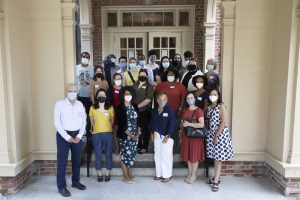
Sibby Anderson-Thompkins guided the program to such success for 10 years. She is now chief diversity officer at Sewanee: University of the South. Most recently, leadership of CPPFD has now transitioned to Vice Chancellor for Research Terry Magnuson and Associate Vice Chancellor for Research Joyce Tan.
“For over 30 years, CPPFD has been an invaluable program for identifying and training talented research scholars from diverse backgrounds to prepare for faculty positions,” Tan says. “As we look to the future, we are dedicated to continuing and expanding this signature program to continue to diversify Carolina’s faculty and contribute to training talented diverse scholars for academic careers.”
Including the six 2021 fellows, there have been 204 CPPFD scholars. Of those, 69 became UNC faculty. The university hired four this year. Karen Sheffield-Abdullah is an assistant professor in the School of Nursing; Ana María Silva Campo is an assistant professor in the history department within the College of Arts & Sciences; Deshira Wallace is an assistant professor in Gillings School of Global Public Health; and Teshanee Williams is an assistant professor in the School of Government.
Forty-six academic institutions have hired other fellows. This year, Columbia Law School hired Kerrel Murray.
The 2021-2023 CPPFD Fellows are:
[row]
[column lg=”4″ md=”12″ sm=”12″ xs=”12″ ]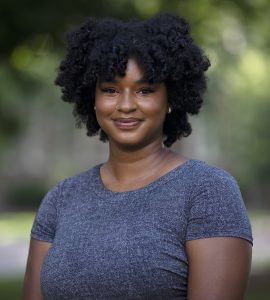 [/column]
[/column]
[column lg=”8″ md=”12″ sm=”12″ xs=”12″ ]Kayla Fike, School of Education
Kayla Fike’s research focuses on legacies of racialized and classed inequities in urban communities, such as community violence, interpersonal racial discrimination, and public narratives of urban neighborhoods. Through her scholarship, she aims to highlight ways that young Black and Brown people navigate interpersonal and systemic discrimination and rely on their resources and skills to thrive. In her newest research, she examines potential contributing factors to urban-residing young Black adults’ ratings of the quality of their neighborhoods, with specific attention to the role of gender.
Fike holds a PhD in Psychology and Women’s and Gender Studies from the University of Michigan.[/column]
[/row]
[row]
[column lg=”4″ md=”12″ sm=”12″ xs=”12″ ]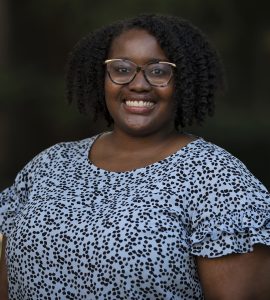 [/column]
[/column]
[column lg=”8″ md=”12″ sm=”12″ xs=”12″ ]Tamera Hughes, Eshelman School of Pharmacy
Tamera Hughes seeks to address health care disparities affecting medically vulnerable and underserved communities in pharmacy practice. She is motivated by more than 10 years of experience in various scholarly endeavors that began while serving as an undergraduate researcher in the Jackson Heart Study. She also serves as a practice transformation coach with Flip the Pharmacy, a new pharmacy-practice initiative focused on the enhanced delivery of community pharmacy health care services.
Hughes holds a PhD from the Mercer University College of Pharmacy.[/column]
[/row]
[row]
[column lg=”4″ md=”12″ sm=”12″ xs=”12″ ]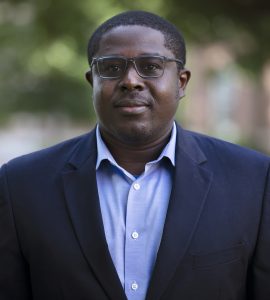 [/column]
[/column]
[column lg=”8″ md=”12″ sm=”12″ xs=”12″ ]Edem Klobodu, Kenan-Flagler Business School, Department of Marketing
Edem Klobodu is broadly interested in the role and nature of marketing among the underprivileged. He studies mobile money loans’ impacts, design, and rollout among the low-income demographic which historically lacked access to formal finance. Additionally, his research explores the links between mobile money loans and temptation goods. During the initial stages of the COVID-19 pandemic, he studied consumer responses to lockdowns using big data from Ghana. Primarily his work employs descriptive causal or quasi-experimental methods to study consumption among the poor.
Klobodu holds a PhD in Marketing from the University of Texas at San Antonio.[/column]
[/row]
[row]
[column lg=”4″ md=”12″ sm=”12″ xs=”12″ ]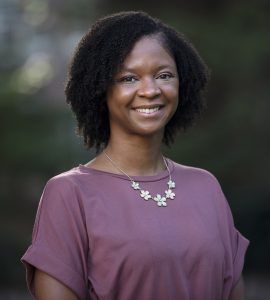 [/column]
[/column]
[column lg=”8″ md=”12″ sm=”12″ xs=”12″ ]Patrece Joseph, Gillings School of Global Public Health, Department of Health Behavior
Patrece Joseph uses community-engaged methods to improve the health of adolescents from marginalized communities. She is interested in adolescents’ health-related beliefs, decision-making skills, and health behaviors. She is also passionate about designing, implementing, and disseminating interventions that consider adolescents’ developmental trajectories and contexts, and build on their strengths.
Joseph holds a PhD in Child Study and Human Development from Tufts University.[/column]
[/row]
[row]
[column lg=”4″ md=”12″ sm=”12″ xs=”12″ ]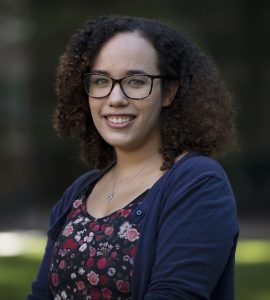 [/column]
[/column]
[column lg=”8″ md=”12″ sm=”12″ xs=”12″ ]Jamilläh Rodriguez, College of Arts & Sciences, Department of Linguistics
Jamilläh Rodriguez’s projects focus on endangered and understudied languages and include work on Copala Triqui, Malawian CiTonga, Ch’ol, and Brazilian Portuguese. She combines computational, experimental, and statistic methodologies that enhance traditional linguistic fieldwork, particularly with understudied and endangered languages. She values collaboration and interdisciplinary work to fill in gaps that can go unnoticed in a single discipline.
Rodriguez holds a PhD in Linguistic Anthropology from the State University of New York at Albany.[/column]
[/row]
[row]
[column lg=”4″ md=”12″ sm=”12″ xs=”12″ ]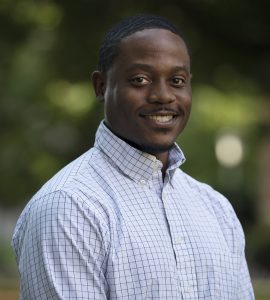 [/column]
[/column]
[column lg=”8″ md=”12″ sm=”12″ xs=”12″ ]Earnest Taylor, School of Medicine, Department of Cell Biology and Physiology
Earnest Taylor will use human joint tissue cells and in vivo experiments to study cell signaling pathways that regulate anabolic and catabolic activity responsible for osteoarthritis. He hopes to identify phospho-proteins associated with oxidative stress that occurs with aging and joint injury that can alter the activity of various signaling pathways.
Taylor holds a PhD in Pharmaceutical Science from Mercer University.[/column]
[/row]